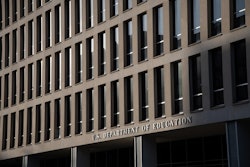Women and people of color can expect fewer government contracts and faculty positions at public universities if Michigan voters this fall approve a ban on affirmative action, a study released Monday suggests.
In November, Michigan citizens will be voting in the general election ballot on a proposed amendment to the state’s constitution called the Michigan Civil Rights Initiative. The initiative seeks to ban public employment, public education and public contracting programs that give consideration to groups based upon their race, gender, color, ethnicity or national origin.
The amendment is modeled after Proposition 209, which California voters adopted in 1996. Like the California proposition, the MCRI is sponsored by Ward Connerly, the former University of California regent.
The study, conducted by the Center for the Education of Women at the University of Michigan, drew on employment, contracting and education data since the passage of Proposition 209 to predict the impact a similar measure would have in Michigan.
“The California experience suggests that the people of Michigan can expect the impact of the initiative to be quite broad, affecting not only affirmative action but also outreach efforts designed to ensure access to opportunity,” says CEW Associate Director Susan Kaufmann in the report. “California courts have consistently construed Prop. 209 broadly, striking down not only those programs that were designed to benefit racial and ethnic minorities or women, or that included participation goals, but even those that sought to remedy documented patterns of discrimination.
The California initiative has resulted in the elimination of college preparation programs for minority students, science programs for girls and outreach to minority- and women-owned businesses seeking government contracting opportunities, Kaufmann says.
In terms of higher education, the study cited statistics provided by Richard Atkinson, the former president of the University of California system. He said Black enrollment dropped, particularly at the selective University of California, Berkeley and Los Angeles campuses. This fall, UCLA will enroll fewer than 100 Black students, the smallest number “since at least 1973,” Atkinson says. And the number of Latino and American Indian students also plummeted after the passage of the proposition.
“Low and, in some cases, declining enrollments of under-represented minority students appear to be the result of several factors resulting from Prop. 209: the end of affirmative action; elimination of targeted outreach programs; the perception, as numbers dwindle, that the university is unwelcoming; and a growing tendency for students with strong academic records to enroll elsewhere,” Kaufmann says.
“Any state tempted to emulate the example of California should think long and hard about the consequences,” he added.
MCRI has lost support among Michigan voters lately. According to a recent Detroit Free Press poll, only 43 percent of those polled supported the measure, while 42 percent were opposed.
The initiative’s opponents include One United Michigan, a coalition of organizations and individuals, and both current Gov. Jennifer M. Granholm and her Republican challenger, Dick Devos. Both major political parties have formally come out against the measure. And one group, Operation King’s Dream, filed a federal lawsuit Thursday on behalf of 125,000 Black Michigan voters to have the initiative removed from the ballot. The group says the voters were deceived into signing a petition to have the amendment placed on the ballot.
— By Ibram Rogers
|
Reader comments on this story: |
|
There are currently no reader comments on this story. |
© Copyright 2005 by DiverseEducation.com















